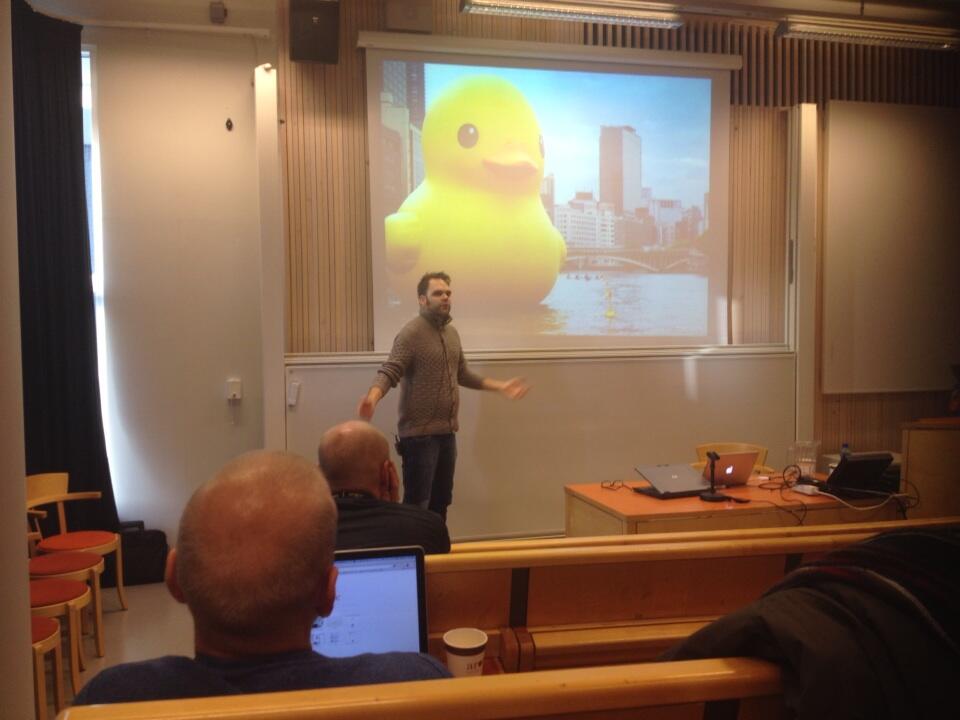Ten things I’ve learned about data journalism
I’ve been working with data journalism since 2010. Here are ten things I’ve learned.

PHOTO: Eirik Meling via Twitter:»Journalism is really important» @lambrechts shows best practice in Norway. #djinorden13 pic.twitter.com/SR9MIl5Tly
#1
JOURNALISM IS
REALLY REALLY REALLY REALLY
REALLY REALLY REALLY REALLY
REALLY REALLY REALLY REALLY
REALLY REALLY REALLY REALLY
REALLY REALLY REALLY REALLY
REALLY REALLY REALLY REALLY
IMPORTANT
It’s easy to make fun of journalism. Too much space is used on whom the rich and the famous are dating, on what to not eat and Apple’s new products. Look beyond that, journalism is at its best when it’s the caped crusader for the weak.
#2
Data journalism is an evolution of journalism, not a revolution.
We are standing on the shoulders of giants. We are here to build upon what they’ve done, not to tear it down. New times requires new tools. New possibilities give room for new ways to tell a story.
#3
Don’t do data journalism just to do data journalism.
We are here for our readers. Use data journalism to give them insight, not show off for friends and colleagues. A lot of stories can be told amazingly well with plain text. Use data journalism when it’s necessary. Don’t reduce it to a hype.
#4
Don’t be alone.
Don’t lock yourself away with your spreadsheets, python code and javascripts. Don’t be that person. Share your knowledge with your colleagues. Inspire them; show them that data journalism isn’t rocket science. At Bergens Tidende our goal is to create small terror cells of data journalism throughout the newsroom.
#5
The Internet is important.
The Internet can be more than coverage of breaking news and videos of cute kittens. The possibilities for telling a story are endless. Show people how magnificent it can be.
Build upon the openness culture of the web. Share tips and tricks with the world. Share data, share code. How many times haven’t StackOverflow saved you? Now it’s your turn.
#6
The more you learn, the less you know.
It can be fatiguing sometimes. Every time you climb on top of a mountain, you’ll see five hundred higher new mountaintops to climb. Don’t try to do everything. You’re not Magnus Carlsen. Prioritize.
#7
Don’t be boring. Ever.
No one has ever bored themselves to knowledge. Make sure what you do is interesting for the reader. You don’t have to be tabloid. Just don’t be boring.
#8
En journalist må hver dag stille seg selv spørsmålet: Hva ønsker de å skjule for oss i dag? Vi har rett til å vite hvordan pengene brukes.
— GunnarBodahlJohansen (@gubojo) January 4, 2013
TRANSLATED: «Journalists must ask themselves this question daily: What are they trying to hide from us today? We have the right to know how our money is spent.»
JOURNALISM IS REALLY REALLY REALLY REALLY
REALLY REALLY REALLY REALLY REALLY REALLY
REALLY REALLY REALLY REALLY IMPORTANT
WITH sugar on top
It’s our job to find out how the government spends our money.
Harass your local government with FOIA-requests. If you don’t do it, noone will. And follow up on Páal Hilmarsson encouragement to lobby for open data.
#9
Go big or go home.
Forgive me the pretentiousness, but there are no reasons to restrict your ambitions. Aim for the sky and commit yourself. On the Internet you’re not restricted by circulation. There are still a few new rules to be written, why not be the one writing them?
#10
FIGHT! Fight for your stories. Fight for your place in the newsroom. Fight for understanding of your profession. Journalism needs data journalism to evolve. Make it your mission.